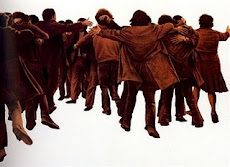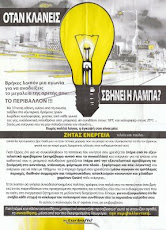
I always liked parables because it was easier for me to catch the deeper meaning, which most of the times cannot be given in a form of a lecture or an essay.
I even now have my eyes and ears open for a good parable and I enjoy the mental process that takes place in my mind trying to decipher it (that's a good definition for the name of the blog...). From all the parables I have read I find the most difficult to understand the parables of Jesus, and the most nice to read the parables of Leo Tolstoy. But one specific parable that I read for the first time long ago was the one that had the greatest impact on me. I read it also from the books of Gurdjieff and his students, but I came across it also later, while reading the Upanishads (philosophical books of Vedas written around 1000 - 600 BC from unknown writers in India). I hope it is as enlighting for you as it was for me...
By the way I don't want to take credit for the following article which I found here: http://www.geocities.com/gadbyme/The_Horse_the_Carrage_and_the_Driver.html
In the article I have made a few remarks which I set between brackets and in red color [].
The Parable of the Horse, the Carriage, the Driver & the Master.
This is the story of the horse, carriage, and driver. The parable begins by supposing that the driver of a horse and carriage has abandoned and forgotten his duties. He is drunk in a public bar, wasting his money, and in his drunken state, [I personally prefer the term sleeping] he thinks that his statue is that of the master instead of a servant. The horse is unfed and weakening, and his reigns are in disarray or lost. The carriage has fallen into poor condition. The master is away from the scene and will not return to ride in the carriage until the driver is back on the box of the carriage and everything is in order. This parable exposes the inner human state, we are shown how three components of the self, the body, emotion, and mind are not in a balance with one another.
In this parable, the carriage represents the human body, the horse represents the emotions, [another word can be also used here: senses] and the driver the intellectual mind. The state of drunkenness depicts the typical condition of our human minds. It stands for kind of imagining perception, which is based on sensory perception, past trauma, future expectations, the constant flow of mental images and how we identify ourselves by our job, relationships, possessions, monetary value etc. In our "drunkenness" we mechanically shift from one sub-personality to the next, reacting to perceived influence that affect the image of our personal sovereignty. We are under the illusion that we are masters of ourselves and of our destiny, when in fact these three basic components of our being are not at all in harmonious relationship with each other. Body, emotion, and mind are kept out of balance and unsynchronized as the illusion of control flip-flops form one component to another.
According to this parable, what must happen? First, the driver must wake up to understand his state. He must stop his drunken imaginings and momentarily disidentify from his familiar state of mind long enough to recognize the condition into which he has trapped himself. Then he must leave the public drinking house and go out and repair the carriage (care for is physical body), and attend to the needs of the horse (the emotional self). Once this is done, the driver can lift himself up onto the box. Then he can regain the reigns and hold them firmly in hand. [Or/and be of control of his senses]. It is only at this point when the driver has done everything he can to set things in proper order that the master can return to the scene and occupy his position within the carriage. However, in this parable the master does not immediately return and give directions for proceeding. The driver must begin the movement of horse and carriage in the direction that he thinks best and then listen intently for corrective guidance from the master within the carriage.
This is a parable of extraordinary depth and insight it illustrates a number of is an indispensable agent in initiating the changes in conditions that leads to awakening ones higher awareness.places in which the human will plays a critical role. The dual function of the human will. [Plato is more specific, according to my opinion, with this duality. He speaks of love which we have since we are born and is love for the pleasure and of love that we gain as we grow older and is love of the good. The irrational love against the rational]. It is the will, which directs attention and allows certain thoughts and emotions to shape our sense of identity. It is, therefore, through an active will that we are able to disidentify from old familiar personality states and awaken enough to reorganize from a different point of view than the hopeless condition into which we have placed ourselves. This is accomplished through the systematic practice of an exercise Gurdjieff (the author of this parable) [As I already mentioned the original idea derives from the Upanishads] called "self-observation". It is a matter of creating a kind of inner separation so that one stands aside and watches the self interact with life.
[For further reading go to the above mentioned site but it is more a way to continue with what you have learned from the parable and I didn't find it well written. On the contrary, if you found the parable interesting you can read the Man's Possible Evolution, by Gurdjieff's student Ouspensky, also available in Greek.
If I am not mistaken the Upanishad that the above story is mentioned is the Katha Upanishad. Available in Greek in the book " Οι δέκα κυριότερες Ουπανισάδες".
Remarkable is the resemblance of Plato's own parable with this one, where we speaks of a chariot, the rider and two horses a white (good with wings that tries to follow the Gods) and a black (bad that always brings the chariot down) Pheadros - Φαίδρος.
P.S. A point that is worth thinking about is, who, after all, is this Master.
Hope you enjoyed it.]


























Δεν υπάρχουν σχόλια:
Δημοσίευση σχολίου